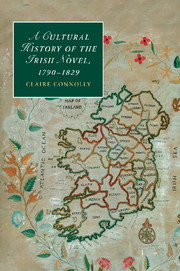Chapter 3 - Love and marriage
Published online by Cambridge University Press: 05 December 2011
Summary
Why does England so pertinaciously resist our independence? Is it for love of us – is it because she thinks we are better as we are?
Theobald Wolfe Tone, Journals, 27 April 1798Says he, ‘Two independent States, finding their separate existence mutually inconvenient, propose to form themselves into one state for their mutual benefit.’ (They find the state of Celibacy mutually inconvenient; they, therefore, resolve to take the advice of their Friends, and to propose a Treaty of Marriage, or, in other Words, an Union. – God grant that they may turn out a happy Couple, and that the said Union may not terminate in a Divorce!)
To be, or not to be, a Nation; that is the Question? (Dublin, 1799)In the epigraphs quoted above, the language of love and the emotions stands in contrast to the treaty-based discourse of marriage and divorce. Love and marriage form part of a shared repertoire of meanings, in which intimate relations and their codification within society speak to a set of abstract political problems. Does England truly love Ireland? Or is Union more a matter of putting British–Irish affairs on a proper legal footing, as in the public parameters implied by marriage? Concepts of love and marriage are used in this chapter to address the ways in which different kinds of affective ties between Ireland and Britain are imagined in literary texts, most commonly in novels that realise Irish–British relations in terms of a marriage that promises to dissolve differences. The issue of how Ireland is represented within the novel form is linked in this chapter to the question of affect, analysed in terms of a dynamic relationship between love, the domain of feelings, and marriage, taken to represent the organisation of those feelings within public structures. More amorphous than the tension between landscape and map discussed in the preceding chapter, the concept of affect nonetheless shares ground with the competing representations of land that I analysed there, not least in the prominence of emotional responses to questions associated with Irish life, history and politics.
The opening quotations suggest the importance of the emotions in registering forms of political experience: rather than serving as an ancillary or artificial literary discourse in which novels seek to make sense of recent history, allegorical gestures towards affective structures are already embedded within the experience of political change. Love and marriage are embedded within a past that can be itself understood in terms of the history of the sensations. The operations of sympathy and its involvement with forms of sociability that are structured around particular political and historical scenes are tracked through the chapter, which reads the amatory content of the Irish romantic novel – sensibility, courtship, passion, enthusiasm, jealousy and, of course, marriage – in relation to a contemporary political scene itself possessing an affective dimension and seeks to provide a more fully contextualised account of the national romance form.
- Type
- Chapter
- Information
- A Cultural History of the Irish Novel, 1790–1829 , pp. 85 - 124Publisher: Cambridge University PressPrint publication year: 2011



